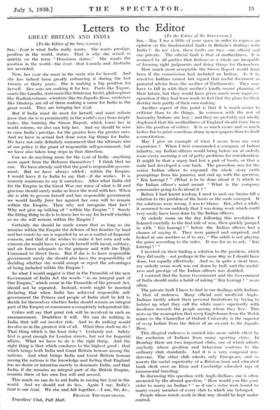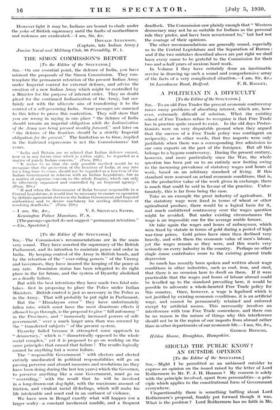[To the Editor of the Sent-rAmal Sm,—May I use a
little of your space in order to express an opinion on the fundamental faults in Britain's dealings with India ? In my view, these faults arc two—one official out one private. The official fault is that of motherliness. It is assumed by all parties that Indians as a whole are incapable of forming right judgments and doing things for themselves. How much more acceptable the Simon Report would have been if the commission had included an Indian. As it is, sensitive Indians cannot but regard that useful document as parental advice from the mother of Parliaments. They may have to fall in with their mother's kindly-meant planning of their future, but they would have given much more eager co- operation if they had been made to feel that the plans for their destiny were partly of their own making.
Another aspect of this point is that it is much easier to criticize than to do things. In common with the rest of humanity Indians are lazy ; and they arc probably not wholly displeased that the motherliness of England should force them into the position of critics. It is so nmeh easier and so much better fun to print scurrilous abuse in newspapers than to draft a constitution.
May I give an example of what I mean from my own experience ? When I first commanded a company of Indian infantry, my Indian officers would bring before me at orderly room every morning is set of petty problems for consideration. It might be that a sepoy had lost a pair of boots, or that a mule had developed a sore back. The procedure was for the senior Indian officer to expound the whole story (with promptings from his juniors), and end up with the question, " Kia karengi ? " (What is to be done about it ?) which in the Indian officer's mind meant " What is the company commander going to do about it ? "
Before I had learnt wisdom, I used to rack my brains till a solution to the problem of the boots or the mule emerged. If the solutions were wrong, I was to blame. But, after a while. it occurred to me suddenly that I was doing work which could very easily have been done by the Indian officers.
At orderly room on the day following this revelation, I listened carefully to the first tale of woe, then quickly jumped in with " Kia karengi ? " before the Indian oflieers bad a chance of saying it. They were pained and surprised, and looked at one another as if to say, " The sahib is not playing the game according to the rules. It was for us to ask, Kia karengi ? ' "
I insisted on their finding a solution to the problem, which they did easily—not perhaps in the same way as I should have done, but equally effectively. And so, in quite a short time, my orderly room work was cut down by half, and the useful- ness and prestige of the Indian officers was doubled.
I contend that the home Government and the Government of India should make a habit of asking " Kia karengi ? " more often.
The private fault I have to find in our dealings with Indians is that of rudeness. Many official and unofficial Anglo- Indians tacitly admit their personal limitations by trying to bolster up what they call the white man's superiority with insolence towards the people among whom they live. This rests on the assumption that every Englishman from the Welsh miner to the Chancellor of Oxford University is the superior of every Indian from the driver of an ox-cart to Sir Jagadis Bose.
This illogical rudeness is carried into more subtle effect by the exclusion of Indians from many sporting clubs. In Bombay there are two important clubs, one of which admits anybody whose position and behaviour conform to the ordinary club standards. And it is a very congenial ren- dezvous. The other club admits only Europeans, and so asserts the social superiority of a Brixton born and educated bank clerk over an Eton and Cambridge educated raja of immemorial breeding.
In discussing this question with Anglo-Indians, one is often answered by the absurd question, "how would you like your sister to marry an Indian ? " as if one's sister were bound to marry every member of every club to which one belonged. People whose minds work in that way should be kept under control. However light it may be, Indians are bound to chafe under the yoke of British supremacy until the faults of motherliness and rudeness are eradicated.—I am, Sir, &c.
DONALD ANDERSON.
(Captain, late Indian Army.)
Junior Naval and Military Club, 96 Piccadilly, W. 1.











































 Previous page
Previous page